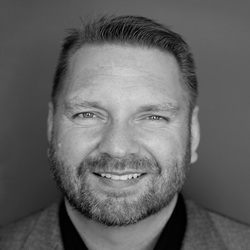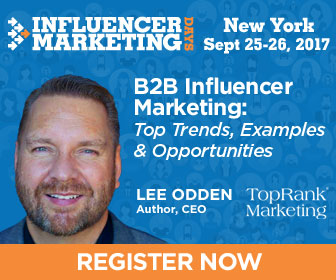Following up on my recent announcement of Lee Odden as a keynote speaker of this year’s Influencer Marketing Days conference, I am pleased to bring you our newest interview with the man who, in many ways, shapes present-day influencer marketing – through his thought leadership and work.
Without further ado, here is the interview for you to enjoy:
Question: In a few words, could you please tell the IMD’s community about yourself and what you do?
 Lee: I am the CEO and co-founder of TopRank Marketing, a digital marketing agency that provides content, search, influencer, social and online advertising servicies to mid-market and large enterprise brands like Dell, LinkedIn, SAP and BMC Software. Outside of my executive duties at the agency, I am very active in the industry speaking at about 30 conferences per year in the US and Europe. I’m also the author of a book called Optimize, published by Wiley and have written over 1.4 million words on various marketing topics at toprankblog.com.
Lee: I am the CEO and co-founder of TopRank Marketing, a digital marketing agency that provides content, search, influencer, social and online advertising servicies to mid-market and large enterprise brands like Dell, LinkedIn, SAP and BMC Software. Outside of my executive duties at the agency, I am very active in the industry speaking at about 30 conferences per year in the US and Europe. I’m also the author of a book called Optimize, published by Wiley and have written over 1.4 million words on various marketing topics at toprankblog.com.
Question: Influencer marketing has been around for a few years and has already had its share of ups and downs. What are the biggest challenges that you see it face now?
Lee:
- Many opportunists are applying the influencer name on things that are less about influence and more about advertising or link building.
- There are differences between B2C and B2B with influencer marketing that can cause some disconnects. Our research study with Traackr and Altimeter on enterprise influencer marketing found that B2B is playing catch-up to B2C in terms of ongoing influencer programs vs. short term campaigns or even experimenting.
- Other challenges include rules around disclosure and compliance with the FTC in the US. In Europe, GDPR complinance that is coming in 2018 could cause some real issues. For example, some companies view the use of an influencer’s public social data (to determine if they are influential or just to learn about them) is off-limits without permission first. That interpretation could mean a stop to many social and influencer data applications.
Question: How can marketers overcome these?
Lee:
- Continued education about what influence marketing is and isn’t is important. I’ve tried to do my part by writing articles, doing interviews and giving presentations on influencer marketing at over 20 events in the US and Europe this year alone.
- As for closing the gap between B2B and B2C, I think we’re already seeing a lot of that as B2B companies become more willing to implement ongoing influencer programs. In our study, content was the top area of business most impacted by influencer marketing programs. Content is the core of marketing, especially in B2B, so there are many opportunities for B2B brands to increase adoption and sophistication at working with influencers when content is involved.
- As for disclosure, FTC and GDPR compliance, companies need to understand what the rules are and reconcile with their legal resources to adjust influencer marketing processes, engagement and governance.
Question: What, in your opinion, is the biggest advantage of (doing) influencer marketing?
Lee: My experience and that of our agency working with many companies of different sizes and solutions, is that content developed in collaboration with influencers brings the biggest advantage.
It would be easy to say reaching new audiences or advocacy, but the fundamental role content plays in marketing makes it an incredibly valuable resource. Influencers help create the content, they add 3rd party credibility and expertise to the content, they can help promote the content to interested and relevant audiences as well.
On top of all that, the experience of co-creating content that delivers mutual value helps the brand develop a relationship with the influencer. Relationships are key with influencers for many reasons but one of the most important is that competition for top influencers is rising fast and it is often a strong relationship and loyalty to the brand that keeps influencer attrition low and advocacy high.
Question: When operating on a tight budget, but wanting to hop on the influencer marketing bandwagon, where would you recommend a company to focus their efforts, how, and why?
A: Look for advocates of your brand that are influential. Expand your view of influencers to include current customers, employees and members of your community or industry. Engage those warm connections that are already showing love for the brand and invite them to collaborate on content or in some other way. Devlop processes out of that exercise and use what you learn to develop a business case or a scalable program.
 Question: On September 26, 2017 you’re keynoting Influencer Marketing Days. Why should marketers want attend your session?
Question: On September 26, 2017 you’re keynoting Influencer Marketing Days. Why should marketers want attend your session?
Lee: It’s a keynote – can they go anywhere else? 😃 For marketers that want to know some of the the trends in the influencer marketing world based on original research for large enterprise companies and models for programs that have worked (with examples) at large companies like Dell, Oracle and SAP, then my session will be useful.
Question: If you were to give one influencer marketing advice to brands/advertisers, and one to influencers, what would they be?
Lee: Always figure out what the influencer cares about and what motivates them so you can develop an more effective strategy and engagement approach. Empathy goes a long way in marketing today and especially with a very human to human and communication-centric discipline like influencer relations.

Trackbacks/Pingbacks